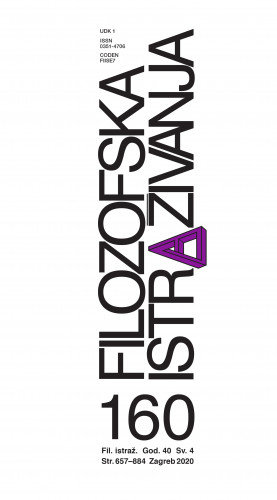U radu se propituje odnos filma i filozofije, naročito u svjetlu Wittgensteinove filozofije i tvrdnje da (pokretna) slika predočuje svijet čak i bolje od jezika te da je u tom smislu posebno filozofski relevantna. Polazi se od čestog razlikovanja filma kao ilustracije filozofije, filma o filozofiji ili filozofima te filma kao filozofije. I dok se prva dva načina njihova odnošenja ne smatraju problematičnima, ali ni filozofski posebno relevantnima ili teorijski izazovnima, za treći se koncept pokazuje suprotno te mu se pristupa unutar Wittgensteinove filozofije. Naime, valja pokazati zašto je film kao pokretna slika za Wittgensteina uopće moguć kao filozofija, odnosno što točno omogućuje filmu da bude kao ta specifična ljudska aktivnost. Da bi se to pokazalo, analizira se Wittgensteinova filozofija s jasno naglašenom razlikom u njegovu ranom i kasnom filozofskom radu. No dva njegova djela, koja paradigmatski stoje iza dviju faza, pokazuju i određeni kontinuitet u razmatranju slika. Prije svega, tiče se to ideje o mogućnosti da upravo slika, a onda ekstenzijom i film kao nizanje slika, najbolje predočava svijet, odnosno da za njega stoji kao dvodimenzionalni model. Budući da je moguće utvrditi kako za Wittgensteina slika ne ovisi o jezičnoj interpretaciji, pokazuje se da je film kao filozofija moguć upravo, premda ne i isključivo, iz kuta Wittgensteinova filozofskog rada koji sliku tretira kao samostalnog nositelja značenja, a što u konačnici rezultira i shvaćanjem Wittgensteinove filozofije kao izravno suprotstavljene filozofskoj tradiciji Zapada. Stoga je jedno od tumačenja relevantnosti filma za filozofiju moguće utemeljiti upravo u Wittgensteinovu razumijevanju slike.; This paper examines the relationship between film and philosophy, especially in the light of Wittgenstein’s philosophy and his claim that a (motion) picture represents the world better than the language itself and that, in that sense, it has philosophical relevance. It starts with an often made comparison of film illustrating philosophy, film about philosophy or philosophers, and film as philosophy. While the first two types are not particularly philosophically relevant or theoretically challenging and therefore not considered to be problematic, the third concept shows the opposite, and it is approached within Wittgenstein’s philosophy. Namely, it is necessary to show why film as motion picture would even be possible for Wittgenstein as philosophy, or more precisely, what it is exactly that enables the film to be like philosophy. To illustrate this, Wittgenstein’s philosophy is analysed, with an emphasis on the difference between the early and late phase of his work. Yet his two philosophical studies, paradigmatic for these phases, show a certain continuity in consideration of images. Foremostly, they supply the primary argument that image, and by extension film as a series of images, best represents the world, that is, that for Wittgenstein it stands as a twodimensional model. Since it is possible to show that image for Wittgenstein does not depend on linguistic interpretation, it can be shown that film as philosophy is possible precisely but not exclusively from the angle of Wittgenstein’s philosophical work. This treats the image as an independent bearer of meaning, which ultimately results in understanding Wittgenstein’s philosophy as directly opposed to the Western philosophical tradition. Thus, one of the possible interpretations of film’s philosophical relevance is possible to find in Wittgenstein’s understanding of pictures.
Sažetak

 Filozofska istraživanja : 40,4(2020) / glavni i odgovorni urednik Ante Čović.
Filozofska istraživanja : 40,4(2020) / glavni i odgovorni urednik Ante Čović.